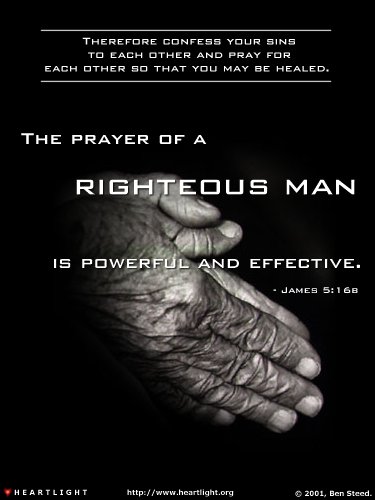MONDAY, JANUARY 31, 2011 (TOP)
SOCIAL JUSTICE
(DEUTERONOMY 23:9-25:19)
 "You shall not pervert justice due the stranger or the fatherless, nor take a widow's garment as a pledge. But you shall remember that you were a slave in Egypt, and the LORD your God redeemed you from there; therefore I command you to do this thing." -Deuteronomy 24:17-18
"You shall not pervert justice due the stranger or the fatherless, nor take a widow's garment as a pledge. But you shall remember that you were a slave in Egypt, and the LORD your God redeemed you from there; therefore I command you to do this thing." -Deuteronomy 24:17-18
This section continues to define what this new nation of Israel is to look like. This includes a further list that relates primarily to social issues. As we have already stated in our reading of the laws here in Deuteronomy, we must remember they are leaving Egypt, a pagan society, and going into Canaan, a pagan society even more corrupt than Egypt.
These laws were a beginning step in an ancient world where justice and sexual morality were seen very differently. The influence of New Testament revelation on social justice, marriage, sexuality, forgiveness, etc. on today's world many times makes it difficult to fully understand the world that Israel lived in as they were becoming a nation. We take for granted that slavery is wrong, that there is equality for all people, male and female. This was unknown in ancient times. So, in looking at these laws and regulations, what we are left with is a picture of God's desire to establish a basis for justice in the family and for the care of the poor in light of the current social context.
How the poor are treated is an area where we see God especially identifies Himself and His people with a responsibility to make a difference (24:12-22). He promises to bless the nation and the "work of your hands" (24:19) if they help the poor. This remains a core value in the New Testament where James reminds us that pure and undefiled religion before God is the care for the orphan and the widow (James 1:27). How we treat the poor provides a living example of God's love. God should be seen in these regulations an effort to begin to establish protection and justice for women who were divorced, how collateral is handled by a person who loans money (24:10-13), or a woman who is mistreated by her brother-in-law (25:5-10).
We must therefore take these ancient principles and apply them to the world we live in today. At first we may not see any connection. But in fact the issues of justice, treatment of the poor, debt, etc. are still places where God's people must be a voice and light for Him.
NKJV BIBLE TEXT
Deuteronomy 23:9-25:19
 Cleanliness of the Campsite
Cleanliness of the Campsite
9 "When the army goes out against your enemies, then keep yourself from every wicked thing. 10 If there is any man among you who becomes unclean by some occurrence in the night, then he shall go outside the camp; he shall not come inside the camp. 11 But it shall be, when evening comes, that he shall wash with water; and when the sun sets, he may come into the camp.
12 "Also you shall have a place outside the camp, where you may go out; 13 and you shall have an implement among your equipment, and when you sit down outside, you shall dig with it and turn and cover your refuse. 14 For the LORD your God walks in the midst of your camp, to deliver you and give your enemies over to you; therefore your camp shall be holy, that He may see no unclean thing among you, and turn away from you.
Miscellaneous Laws
15 "You shall not give back to his master the slave who has escaped from his master to you. 16 He may dwell with you in your midst, in the place which he chooses within one of your gates, where it seems best to him; you shall not oppress him.
17 "There shall be no ritual harlot of the daughters of Israel, or a perverted one of the sons of Israel. 18 You shall not bring the wages of a harlot or the price of a dog to the house of the LORD your God for any vowed offering, for both of these are an abomination to the LORD your God.
19 "You shall not charge interest to your brother—interest on money or food or anything that is lent out at interest. 20 To a foreigner you may charge interest, but to your brother you shall not charge interest, that the LORD your God may bless you in all to which you set your hand in the land which you are entering to possess.
21 "When you make a vow to the LORD your God, you shall not delay to pay it; for the LORD your God will surely require it of you, and it would be sin to you. 22 But if you abstain from vowing, it shall not be sin to you. 23 That which has gone from your lips you shall keep and perform, for you voluntarily vowed to the LORD your God what you have promised with your mouth.
24 "When you come into your neighbor's vineyard, you may eat your fill of grapes at your pleasure, but you shall not put any in your container. 25 When you come into your neighbor's standing grain, you may pluck the heads with your hand, but you shall not use a sickle on your neighbor's standing grain.
| Cleanliness of the Campsite v. 13 when you sit down outside – During times of war, the army was still expected to maintain good hygiene. Digging latrines outside the camp provided obvious health benefits. v. 14 your camp shall be holy – Cleanliness was also important for ritual and religious purposes. Impurity within the camp of Israel would have caused God to judge them (Deut. 8:11-20). Miscellaneous Laws v. 15 slaves – Israel allowed debt slavery, but that was limited to a term of six years. The slave mentioned in this verse probably refers to a foreign captive who had accepted the conditions of slavery when Israel possessed the Promised Land. | v. 17 ritual harlot – The nations surrounding Israel had ritual harlots who gathered at their temples. The proceeds from their prostitution went directly to their pagan temples. v. 25 you may pluck the heads with your hand, but you shall not use a sickle – This law was a hospitality law and meant to provide food for a hungry person. But it also protected the crop owner from being taken advantage of. Later, Jesus and His disciples benefited from this law as they passed through a grain field and plucked heads of grain to eat (Matt. 12:1). |
DEUTERONOMY 24
Law Concerning Divorce
1 "When a man takes a wife and marries her, and it happens that she finds no favor in his eyes because he has found some uncleanness in her, and he writes her a certificate of divorce, puts it in her hand, and sends her out of his house, 2 when she has departed from his house, and goes and becomes another man's wife, 3 if the latter husband detests her and writes her a certificate of divorce, puts it in her hand, and sends her out of his house, or if the latter husband dies who took her as his wife, 4 then her former husband who divorced her must not take her back to be his wife after she has been defiled; for that is an abomination before the LORD, and you shall not bring sin on the land which the LORD your God is giving you as an inheritance.
| Chapter 24 Law Concerning Divorce. v. 1 uncleanness – "Ervah" (Heb.) usually meant nakedness. But because it does not refer to adultery in context (punishable by death, Deut. 22:22), it may have meant a physical problem, such as the inability to bear children. For centuries this became a controversial passage to the children of Israel. Jesus was confronted about it in Matthew 19:3-9 and in Mark 10:1-12.. | v. 2 certificate of divorce – a legal document that provided certain rights to the divorcee (Lev. 21:7, 14; 22:13; Num. 30:9; Matt. 19:3-9), apparently for her protection. v. 4 an abomination – "Towebah" (Heb.) meant a disgusting thing in both a ritual sense and in an ethical sense, meaning it was considered a wicked thing. The idea here is that if a woman's second husband died or divorced her, she was not to remarry her first husband. That was legal adultery in the eyes of the Lord. |
Miscellaneous Laws
5 "When a man has taken a new wife, he shall not go out to war or be charged with any business; he shall be free at home one year, and bring happiness to his wife whom he has taken.
6 "No man shall take the lower or the upper millstone in pledge, for he takes one's living in pledge.
7 "If a man is found kidnapping any of his brethren of the children of Israel, and mistreats him or sells him, then that kidnapper shall die; and you shall put away the evil from among you.
8 "Take heed in an outbreak of leprosy, that you carefully observe and do according to all that the priests, the Levites, shall teach you; just as I commanded them, so you shall be careful to do. 9 Remember what the LORD your God did to Miriam on the way when you came out of Egypt!
| Miscellaneous Laws v. 5 new wife – It was important for a man to have a posterity that carried on his lineage (25:5-10). Therefore, he was spared his possible death in warfare for a year to accomplish this and to bring sawmakh (Heb. for " to rejoice and be glad") to his wife. Free from the rigors of warfare and the pressures of any business, the husband was to make his wife's happiness his priority, thus making for a strong marriage and future family. v. 6 millstone – A millstone was one of two stones used to grind a family's daily bread. To take either one as a pledge, or collateral for a loan, was to deprive a family of its living. This contradicted the spirit of generosity, which should have been the motivation of the lender. | v. 7 kidnapping – Kidnapping was a capital crime if it entailed mistreating or selling of the victim. This was considered rarah (Heb.), meaning "bad or malignant," and was to be purged to maintain national purity (13:5, 17:7, 12; 19:19; 21:21; 22:21-22, 24). v. 8-9 – These verses deal with leprosy, a malignant skin disease, extensively dealt with in Leviticus 13-14. What we know as leprosy today, Hansen's disease, is different from the disease mentioned here. Miriam, Moses' sister, is the motivation to obey this ceremonial law. She became a victim of the disease when she opposed Moses in Numbers 12. |
10 "When you lend your brother anything, you shall not go into his house to get his pledge. 11 You shall stand outside, and the man to whom you lend shall bring the pledge out to you. 12 And if the man is poor, you shall not keep his pledge overnight. 13 You shall in any case return the pledge to him again when the sun goes down, that he may sleep in his own garment and bless you; and it shall be righteousness to you before the LORD your God.
14 "You shall not oppress a hired servant who is poor and needy, whether one of your brethren or one of the aliens who is in your land within your gates. 15 Each day you shall give him his wages, and not let the sun go down on it, for he is poor and has set his heart on it; lest he cry out against you to the LORD, and it be sin to you.
16 "Fathers shall not be put to death for their children, nor shall children be put to death for their fathers; a person shall be put to death for his own sin.
17 "You shall not pervert justice due the stranger or the fatherless, nor take a widow's garment as a pledge. 18 But you shall remember that you were a slave in Egypt, and the LORD your God redeemed you from there; therefore I command you to do this thing.
19 "When you reap your harvest in your field, and forget a sheaf in the field, you shall not go back to get it; it shall be for the stranger, the fatherless, and the widow, that the LORD your God may bless you in all the work of your hands. 20 When you beat your olive trees, you shall not go over the boughs again; it shall be for the stranger, the fatherless, and the widow. 21 When you gather the grapes of your vineyard, you shall not glean it afterward; it shall be for the stranger, the fatherless, and the widow. 22 And you shall remember that you were a slave in the land of Egypt; therefore I command you to do this thing.
| v. 10-13 pledge – A pledge was an article used to secure a debt. If a poor person had pledged his garment as security, it was to be returned to him every evening so that he could sleep in it and not be cold. This was to be a witness of righteousness, or tsedawkaw ("an ethically right act, before the Lord") in Hebrew. v. 14-15 not oppress – This establishes the correct treatment of employees by employers. Employers could not take financial advantage of them by withholding their wages. Oppress is ashaq (Heb.), meaning "to press upon, to violate and defraud." If someone felt that they were being mistreated, they could cry out to the Lord, for mistreatment was a sin. In these verses, as in the ones before, God is the great equalizer in society between the rich and the poor. He wants all to be treated fairly and with respect, for all are made in His image (Gen. 1:26), no matter financial or social status. | v. 17-18 shall not pervert justice – "Mishpat"(Heb.) means "judgment or ordinance." Moses charges the children of Israel not to pervert justice in their dealings with people who could be easily oppressed and taken advantage of (i.e. the stranger, fatherless, or the widow). Just as God showed compassion on them when they had been oppressed in Egypt (15:15) and they had been redeemed, so they are now to show compassion for the disadvantaged. v. 19-22 shall be for the stranger, the fatherless, and the widow – Because there were no social programs for the poor and needy, God institutes a way to provide for them by having farmers leave some of their crops on the field. This was an appeal to those better off because it was ultimately in their best interest to have a concern for the welfare of others. |
DEUTERONOMY 25
1 "If there is a dispute between men, and they come to court, that the judges may judge them, and they justify the righteous and condemn the wicked, 2 then it shall be, if the wicked man deserves to be beaten, that the judge will cause him to lie down and be beaten in his presence, according to his guilt, with a certain number of blows. 3 Forty blows he may give him and no more, lest he should exceed this and beat him with many blows above these, and your brother be humiliated in your sight.
4 "You shall not muzzle an ox while it treads out the grain.
Marriage Duty of the Surviving Brother
5 "If brothers dwell together, and one of them dies and has no son, the widow of the dead man shall not be married to a stranger outside the family; her husband's brother shall go in to her, take her as his wife, and perform the duty of a husband's brother to her. 6 And it shall be that the firstborn son which she bears will succeed to the name of his dead brother, that his name may not be blotted out of Israel. 7 But if the man does not want to take his brother's wife, then let his brother's wife go up to the gate to the elders, and say, 'My husband's brother refuses to raise up a name to his brother in Israel; he will not perform the duty of my husband's brother.' 8 Then the elders of his city shall call him and speak to him. But if he stands firm and says, 'I do not want to take her,' 9 then his brother's wife shall come to him in the presence of the elders, remove his sandal from his foot, spit in his face, and answer and say, 'So shall it be done to the man who will not build up his brother's house.' 10 And his name shall be called in Israel, 'The house of him who had his sandal removed.'
| Chapter 25 v. 1-3 there is a dispute between men – These verses deal with how to prosecute criminals. When two people had a dispute, they were to let the judges decide which one was righteous and which was wicked. The guilty one was to receive no more than 40 blows. Later, Jewish practice was to limit the number to 39 (2 Cor. 11:24), to be sure that no one received more than 40, even in case of a miscount. Limiting the number of blows and making sure that the presiding judge was present to keep things from getting out of hand insured that the offending brother was not humiliated. The word in Hebrew galah means "to disgrace or dishonor." The law, while meting out the deserved punishment, still sought to preserve the dignity of the person. The idea was that they were still part of the tribe and had to be treated as such. v. 4 muzzle an ox – To let an ox eat while it worked encouraged kindness and consideration to the animals. The Apostle Paul later used this law as an analogy of how people were to support their ministers (1 Cor. 9:9, 10; 1 Tim. 5:17,18). | Marriage Duty of the Surviving Brother v. 5-6 If brothers dwell together – These verses look at a family issue. When a man died without a son, there were the dual concerns of him not leaving an heir to carry on the family name and the surviving widow quickly becoming a beggar because she had children to take care of her. v. 7-10 refuses to raise up a name – It was considered a man's duty (Heb. yaban) to take his brother's widow and produce a son who would raise up a name to his brother in Israel. For various reasons, he might choose not to fulfill this requirement. Genesis 38:8-10 and Ruth 4:1-7 record two such events. However, he was legally bound to keep the family name alive. So if he chose not to follow through with this obligation, his sister-in-law could tell the elders of his city about it and remove his sandal from his foot and spit in his face. These actions showed her strong disapproval of his refusal. Such public disgrace illustrates how God used social pressure to motivate His people to obedience. |
Miscellaneous Laws
11 "If two men fight together, and the wife of one draws near to rescue her husband from the hand of the one attacking him, and puts out her hand and seizes him by the genitals, 12 then you shall cut off her hand; your eye shall not pity her.
13 "You shall not have in your bag differing weights, a heavy and a light. 14 You shall not have in your house differing measures, a large and a small. 15 You shall have a perfect and just weight, a perfect and just measure, that your days may be lengthened in the land which the LORD your God is giving you. 16 For all who do such things, all who behave unrighteously, are an abomination to the LORD your God.
Destroy the Amalekites
17 "Remember what Amalek did to you on the way as you were coming out of Egypt, 18 how he met you on the way and attacked your rear ranks, all the stragglers at your rear, when you were tired and weary; and he did not fear God. 19 Therefore it shall be, when the LORD your God has given you rest from your enemies all around, in the land which the LORD your God is giving you to possess as an inheritance, that you will blot out the remembrance of Amalek from under heaven. You shall not forget.
| Miscellaneous Laws v. 13-16 a perfect and just weight – These verses deal with merchants defrauding their customers by using different-size weights and measures to their advantage, depending on whether they were buying or selling. God wanted the children of Israel to be a people of integrity and honesty, so their measuring devices were to be perfect and just. If they complied with this requirement their days may be lengthened (Deut. 5:16; 6:2; 11:9, 32:47). If they did otherwise, they were an abomination (the same word as in 24:4). | Destroy the Amalekites v. 17-19 remember – This deals with the destruction of the tribe of Amalek for their cowardly attacks on the children of Israel as they left Egypt. Because the tribe of Amalek had shown no fear of God or mercy toward His people, they received no mercy. The Israelites were to blot out the remembrance of Amalek, basically putting them under the same ban as the Cannanites. David would defeat them more than 400 years later (2 Sam. 1:1), but they were not completely wiped out until 300 years after that during the reign of Hezekiah (1 Chr. 4:41-43). "You shall not forget" is the last of nine such commands in Deuteronomy. |












 Translate
Translate








